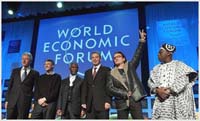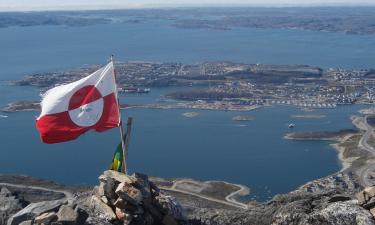WTO powers set low expectations for Davos meeting
The World Trade Organization is in need of some good news.

Six months after the collapse of global free trade talks, the world's largest commercial powers reconvene for the first time this weekend at the World Economic Forum's meeting of global leaders in the Swiss Alps.
Perhaps conscious of the failures of previous trade meetings, ambition for the get-together has been set at an absolute minimum.
"This will be a meeting about process. This will not be a meeting about breakthroughs," WTO spokesman Keith Rockwell said Wednesday.
The so-called Doha round of trade talks has stumbled since its inception five years ago in Qatar's capital. Rich and poor countries have clashed over slashing subsidies and cutting tariffs for international trade in goods and agriculture, and nearly incessant sniping between the European Union and United States has continuously stalled progress.
Summits in Cancun, Mexico, in 2003 and in Hong Kong just over a year ago both failed to outline concrete steps for liberalizing the global economy and were more noteworthy for the public bickering among ministers and the angry street protests they sparked.
The frustration ultimately reached boiling point in July when the WTO's director-general, Pascal Lamy, called for a halt to talks after the organization's most powerful members refused to budge from entrenched positions on farm support and manufacturing tariffs.
"We hope the contacts between the ministers at this meeting will move the negotiations forward," Rockwell told The Associated Press from Geneva. "We would like to see greater clarity in terms of objectives."
The round is supposed to be well beyond this point. It is already two years beyond an original completion date and officials are eagerly trying to forge the blueprint of a deal before July, when U.S. President George W. Bush's authority to make trade deals that can be sent to Congress for a simple yes-or-no vote expires.
Although talks were never formally or legally suspended, Lamy has said that he will only "officially restart" the round when countries signal their readiness to make concessions. He has cited increased momentum in bilateral negotiations involving the U.S., EU, Brazil, India and others, suggesting that the announcement could come in Davos.
Some observers, however, have questioned whether that in itself would carry any significance.
"The move to get the Doha round of talks back on the rails would be welcome, but only if it truly addresses development and is not a stitch-up between the U.S. and the EU," said Barbara Stocking of the international aid agency Oxfam.
"What was being proposed when WTO talks were suspended was far from acceptable," said Stocking, whose organization campaigns on behalf of the trade interests of poorer nations.
On Tuesday in Brussels, EU trade chief Peter Mandelson reiterated his claim that talks have now entered the "endgame," even as U.S. negotiators have steadfastly rejected claims that a major agreement is close.
"There is no deal at hand," said Sean Spicer, a spokesman for U.S. Trade Representative Susan Schwab.
Spicer said the atmosphere, especially between Washington and Brussels, has improved, but declined to say if concrete progress has been made in any specific area.
The U.S. was heavily criticized in July for refusing to significantly cut the subsidies it pays out to American farmers. Washington, however, has blamed the impasse on emerging trade powers such as Brazil and India for maintaining tough tariffs on industrial imports and the EU for refusing to make deeper reductions in its farm tariffs, reports AP.
The economic implications of the round's failing was a repeated topic of discussion among business leaders on the first day of the Forum.
"Maybe the talks that will take place here on Doha will be significant," Forum director Jonathan Schmidt said optimistically at the opening session.
Subscribe to Pravda.Ru Telegram channel, Facebook, RSS!




